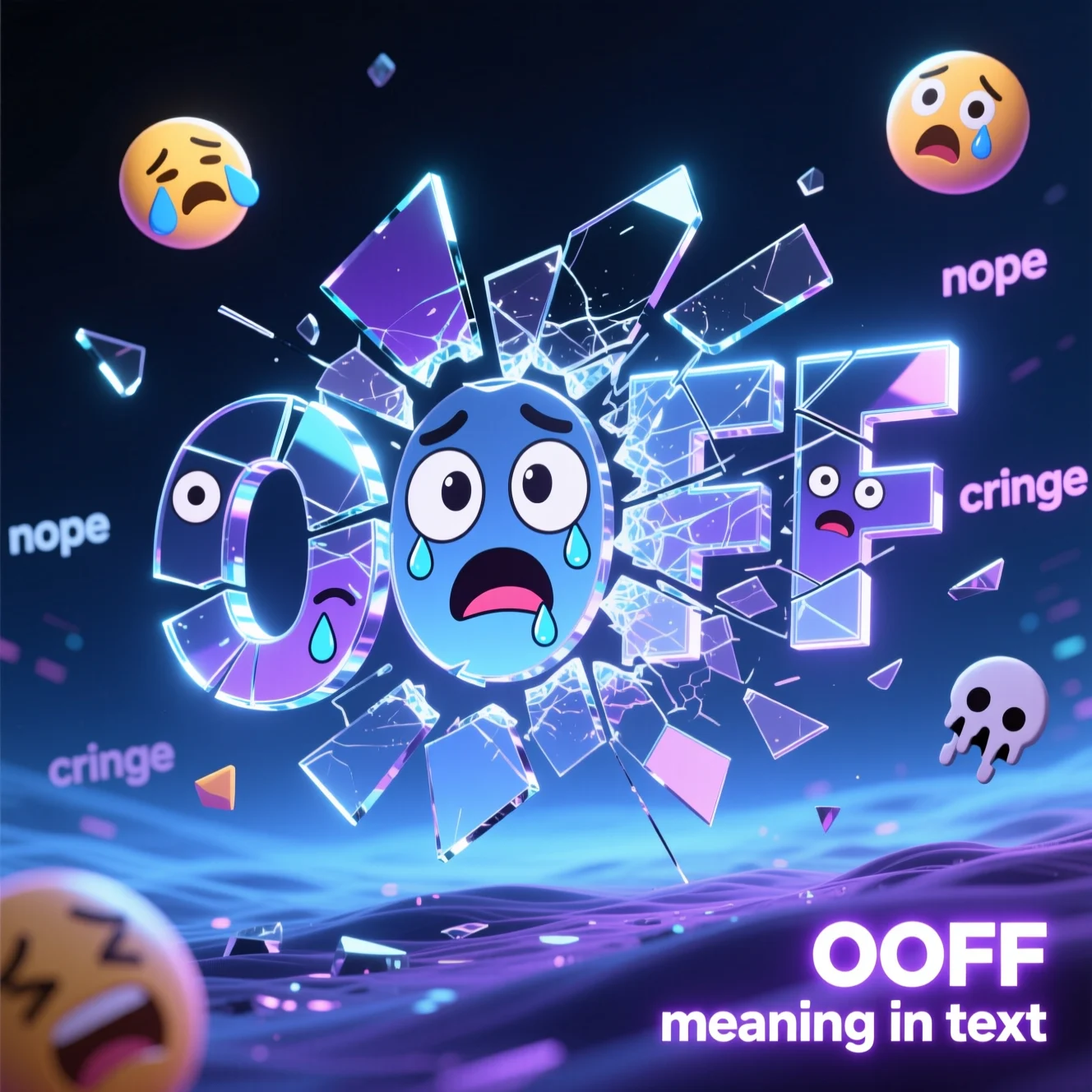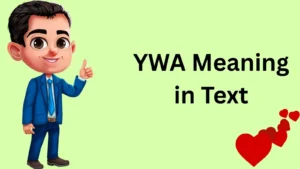Ever received a text with OOF and wondered what it’s about? 🤔 This quirky term is a star in today’s digital chats, popping up in texts, social media, and gaming. Whether it’s a reaction to a funny mistake or a playful expression of surprise, OOF adds spice to conversations. Knowing what it means helps you connect with friends, keep up with online trends, and avoid awkward mix-ups.
From group chats to gaming servers, OOF is a fun way to express yourself. In this guide, we’ll unpack its meaning, history, and how to use it like a pro. Let’s jump in and explore OOF! 🚀
Definition & Meaning
OOF is an expressive term used in texting to show a reaction, often to something surprising, painful, or awkward. It’s like a verbal wince or a playful sound effect.
Key Meanings:
- Reaction to Discomfort or Failure 😬: Expresses sympathy, embarrassment, or reaction to a mistake.
- Surprise or Shock 😲: Used to react to unexpected news or events.
- Gaming Context 🎮: Often tied to a character’s defeat or a tough moment in a game.
Examples:
- Discomfort/Failure:
- Friend 1: “I just tripped in front of everyone! 😳”
- Friend 2: “OOF, that’s rough! You okay? 😅”
- Surprise:
- Friend 1: “They canceled the concert last minute! 😱”
- Friend 2: “OOF, that’s such a bummer! 😔”
- Gaming:
- Gamer 1: “Just got knocked out in the game! 🎮”
- Gamer 2: “OOF, better luck next round! 💪”
Key Point: OOF is a versatile reaction, but its tone depends on the situation! 🗣️
Background & History
OOF has a fun and modern origin story:
- Gaming Roots 🎮: OOF comes from the sound effect in the game Roblox, played when a character dies. It became a meme in the early 2010s as players shared the iconic “oof” sound online.
- Social Media Spread 📱: By the mid-2010s, OOF spread to platforms like Twitter and Reddit, where it evolved into a general reaction for awkward or surprising moments.
- Texting Evolution 💬: Today, OOF is a go-to expression for anything from minor mishaps to big surprises, especially among younger audiences.
Key Points:
- OOF started in Roblox as a death sound effect.
- It grew into a universal reaction term by the late 2010s.
- Now, OOF is common in casual chats and online spaces. 🌐
Usage in Various Contexts
OOF shines in different settings, each with its own vibe:
- Texting 📲:
- Used to react to awkward moments, failures, or surprises.
- Example:
- Friend: “I forgot my lines in the play! 😖”
- You: “OOF, that’s tough! How’d it go? 😅”
- Social Media 🐦:
- Appears in posts or comments to react to funny or shocking content.
- Example:
- Post: “Spilled coffee all over my shirt today! ☕😩”
- Reply: “OOF, been there! 😬”
- Gaming 🎮:
- Common for reacting to defeats or tough moments.
- Example:
- Gamer 1: “Lost my last life in the boss fight! 😵”
- Gamer 2: “OOF, that boss is brutal! ⚔️”
- Casual Conversations 🗣️:
- Used to express empathy or surprise in person.
- Example:
- Friend: “I missed the bus by a second! 🚌”
- You: “OOF, that’s the worst! 😔”
Key Point: OOF adapts to the context, so check the situation to get the tone right! 🔍
Common Misconceptions & Clarifications
OOF is straightforward but can be misunderstood:
- Misconception: OOF is only a gaming term.
- Clarification: It’s used broadly for reactions in texting and social media.
- Misconception: OOF is always negative.
- Clarification: It can express surprise, humor, or sympathy, not just failure.
- Misconception: OOF fits all settings.
- Clarification: It’s too casual for formal conversations and may confuse some audiences.
Key Point: Use OOF in informal settings to avoid confusion. For example, saying “OOF” in a work email might seem unprofessional. 😬
Similar Terms & Alternatives
Here are terms you can use instead of OOF:
- For Reaction to Discomfort/Failure:
- Ouch
- Yikes
- Oh no
- For Surprise/Shock:
- Wow
- Whoa
- Dang
- For Gaming:
- Rip
- F
Comparison Table:
| Term | Meaning | Best Used In |
|---|---|---|
| OOF | Reaction to failure or surprise | Texting, gaming, social media |
| Ouch | Similar to OOF, more physical | Pain or discomfort |
| Yikes | Reaction to awkward moments | Casual chats, social media |
| Rip | Gaming defeat or loss | Gaming communities |
Key Point: Choose alternatives like “yikes” or “ouch” for clarity in specific contexts. ✅
How to Respond to This Term
Your response to OOF depends on the mood:
- Casual 😊:
- Example:
- Friend: “I just failed my quiz! 😣”
- You: “OOF, that’s rough! Wanna study together? 📚”
- Example:
- Humorous 😂:
- Example:
- Friend: “Dropped my phone in the sink! 📱💦”
- You: “OOF, hope it’s waterproof! 😜”
- Example:
- Supportive 🤗:
- Example:
- Friend: “OOF, my team lost the match! 🏀”
- You: “That’s tough, you’ll get ‘em next time! 💪”
- Example:
- Neutral 🔒:
- Example:
- Friend: “OOF, missed my flight! ✈️”
- You: “Oh no, what happened? 😔”
- Example:
Key Point: Match the tone and offer support or humor based on the situation. 🧠
Regional or Cultural Differences
OOF is widely used but varies slightly:
- Western Countries 🌎: OOF is common in texting and gaming, especially among younger people, for reactions to mishaps or surprises.
- Asia 🇯🇵: Popular in gaming communities, tied to Roblox and other platforms, but less common in non-gaming chats.
- Other Regions 🌍: OOF is recognized globally due to social media, but its use is stronger in tech-savvy or gaming-heavy areas.
Key Point: OOF is most common in gaming and casual chats in Western countries, while its use may be niche elsewhere. 🌐
Comparison with Similar Terms
Here’s how OOF compares to similar expressions:
| Term | Meaning | Key Difference |
|---|---|---|
| OOF | Reaction to failure or surprise | Versatile, gaming and casual use |
| Ouch | Reaction to pain or discomfort | More physical, less versatile |
| Yikes | Reaction to awkwardness | Broader, less gaming-specific |
| Rip | Gaming defeat or loss | Specific to gaming, more final |
Key Point: OOF stands out for its playful, multi-purpose use in digital spaces. ✨
Usage in Online Communities & Dating Apps
OOF thrives online:
- Twitter/X 🐦: Used to react to funny or awkward posts.
- Example:
- Post: “Just locked myself out of my car! 😩”
- Reply: “OOF, that’s the worst! 😅”
- Example:
- Dating Apps 💘: OOF shows up in playful chats about mishaps or surprises.
- Example:
- Bio: “Big fan of coffee and OOF-worthy moments 😄.”
- Message: “What’s your latest OOF moment? 😬”
- Example:
- Gaming Communities 🎮: Common for reacting to defeats or funny game moments.
- Example:
- Discord: “OOF, just got wrecked in the game! 😵”
- Reply: “Haha, time for a comeback! 💪”
- Example:
Tips:
- On dating apps, use OOF to share a funny story and spark a chat.
- In gaming, confirm if OOF is about a game loss or a general reaction. 🚀
Hidden or Offensive Meanings
OOF is generally safe:
- No Offensive Meanings ✅: OOF is a playful, neutral term for reactions.
- Potential Issue: In rare cases, overusing OOF in serious contexts (e.g., a sensitive conversation) might seem dismissive.
- Context Matters: Avoid OOF when someone shares serious news to show respect.
Key Point: Keep OOF for lighthearted moments to avoid seeming insensitive. 😊
Suitability for Professional Communication
OOF is not suitable for formal settings:
- Too Casual 📝: OOF is informal and may confuse or seem unprofessional in emails or reports.
- Risk of Misunderstanding: Non-tech-savvy audiences might not know the term.
Alternatives:
- Instead of “OOF, that’s tough,” say “That’s unfortunate” or “I’m sorry to hear that.”
- Instead of “OOF, big mistake,” say “That’s a challenging situation.”
Key Point: Use clear, professional language in work settings for clarity. 💼
FAQs
- What does OOF mean in texting? 🤔
- It’s a reaction to surprise, failure, or awkward moments, often from gaming.
- How do I know when to use OOF? 🧐
- Use it in casual chats or gaming for funny or surprising moments.
- Is OOF okay for work messages? 📧
- No, it’s too informal. Use phrases like “that’s unfortunate” instead.
- Can OOF be offensive? 😳
- Not usually, but avoid it in serious conversations to show respect.
- How should I reply to OOF? 💬
- Try casual (“That’s rough!”), humorous (“Oh no, not again!”), or supportive (“You got this!”).
- Is OOF used differently around the world? 🌍
- It’s most common in gaming and casual chats in Western countries, less so elsewhere.
- Does OOF appear on dating apps? 💕
- Yes, often for playful reactions. Ask about their OOF moment to connect.
Conclusion
OOF is a lively term that captures reactions to surprises, failures, or awkward moments. Born in Roblox and spread through social media, it’s now a staple in texts, gaming, and online chats. This guide covered OOF’s meaning, history, and usage, plus tips to respond with ease. Whether you’re reacting to a friend’s mishap or a gaming defeat, OOF keeps things fun. Just save it for casual settings to avoid confusion. Next time you see OOF, you’ll know exactly how to vibe with it! 🌟😅


